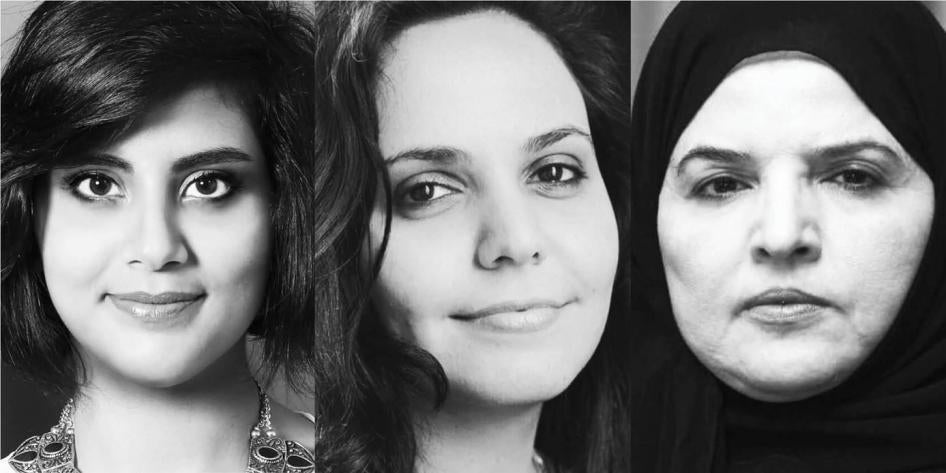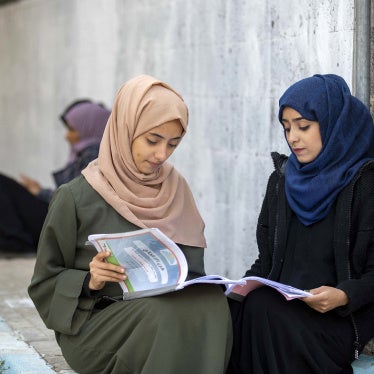(Beirut) – Saudi Arabia’s charges against women’s rights defenders appear almost entirely related to their human rights activities, Human Rights Watch said today. Saudi Arabia opened individual trials on March 13, 2019 of 11 activists, most of them prominent women’s rights advocates detained beginning in May 2018. Saudi Arabia should immediately release all human rights activists detained merely for their rights advocacy, Human Rights Watch said.
Informed sources who have reviewed the prosecutor’s written charge sheets have described to Human Rights Watch the content of charges for two of the detainees, nearly all of which are related to peaceful human rights work, including promoting women’s rights and calling for an end to Saudi Arabia’s discriminatory male guardianship system. The sources said that charges against the other women are similar. Prosecutors also accuse the women of sharing information about women’s rights in Saudi Arabia with journalists based in Saudi Arabia, diplomats, and international human rights organizations, including Human Rights Watch and Amnesty International, deeming such contacts a criminal offense.
“After nearly a year of accusations in Saudi government media that these brave champions of women’s rights are ‘foreign agents,’ the actual charges against them appear to be simply a list of their efforts to promote women’s rights,” said Michael Page, deputy Middle East director at Human Rights Watch. “This is hardly the act of a government that is carrying out reforms, as Mohammad bin Salman and his supporters keep claiming.”
The charges include contact with international journalists based in Saudi Arabia and fully accredited there, foreign diplomats, Saudi human rights activists abroad, and international human rights organizations. They appear to blatantly contradict Crown Prince Mohammad bin Salman’s statements to Bloomberg in an interview in October 2018. When asked whether the women would face charges for talking to foreign diplomats and journalists, he responded: “Journalists, no. But intelligence, yes. Secret intelligence. We have some of them with videos. We can show it to you.”
Bloomberg noted on March 13 that Saudi authorities never allowed journalists to visit prosecutors to view the evidence despite repeated requests. The two charge sheets described to Human Rights Watch make no mention of contact with intelligence agencies.
“If sharing information about women’s rights with journalists and diplomats is illegal, then by that standard most of the Saudi leadership would be in prison right now,” Page said.
Sources told Human Rights Watch that the trials were initially slated to take place in Saudi Arabia’s notorious Specialized Criminal Court, which has jurisdiction over terrorism-related crimes, but the evening before, the Saudi authorities informed detainees’ families that the trials had been moved to Riyadh’s regular criminal court.
A Saudi lawyer well-versed in Saudi court procedures told Human Rights Watch that the switch is highly irregular, as prosecutors would normally submit charges to a relevant court well in advance, and a change of venue would require the initial court to rule that it lacked jurisdiction. He said that the move indicates political influence over the court proceedings.
On March 13, Bloomberg reported that Saudi authorities had barred a group of about 20 foreign diplomats and international journalists from entering the courtroom to observe the hearings. The head of the court, Ibrahim Al Sayari, told journalists that 10 women were on trial, including the prominent activists Loujain al-Hathloul Aziza Yousef, Hatoon al-Fassi, and Eman al-Nafjan.
The Saudi human rights group ALQST reported the same day that 11 women were on trial, including the four mentioned by the head of the court and Mayaa al-Zahrani, Amal al-Harbi, Shadan al-Onezi, and Nouf Abdulaziz, who did not attend her hearing. Two others included Saudi professors Abeer Namankani and Ruqayya al-Mohareb. The eleventh woman remained unidentified, ALQST said. Neither Samar Badawi nor Nasima al-Sada, other detained women’s rights activists, were taken before the court.
The women also face the charge of violating article six of Saudi Arabia’s notorious, vaguely worded cybercrime law, which prohibits “producing something that harms public order, religious values, public morals, the sanctity of private life, or authoring, sending, or storing it via an information network,” with penalties of up to five years in prison and a fine of up to three million Saudi Riyals (US$800,000). Human Rights Watch has repeatedly documented Saudi prosecutors’ use of this vague provision to jail human rights activists and dissidents who criticize Saudi human rights abuses online or peacefully call for reform.
Human rights organizations began reporting in November accusations that Saudi interrogators tortured at least four of the women, including with electric shocks and whippings, and had sexually harassed and assaulted them. In January, Human Rights Watch and Amnesty International said that Saudi authorities should allow international monitors to enter the country and investigate the torture allegations.
The crackdown on women's rights activists began just weeks ahead of the much-anticipated lifting of the driving ban on women on June 24, for which many of the detained activists had campaigned. While some were quickly released, others have remained detained without charge for nearly 10 months.
Authorities accused several of those detained of serious crimes, including “suspicious contact with foreign parties.” Government-aligned media outlets have carried out a smear campaign against them, branding them “traitors.” The Saudi newspaper Okaz reported that nine of those detained will be referred for trial to the Specialized Criminal Court.
On January 2, a panel of British parliament members and international lawyers sent an official request to Saudi authorities for access to the country and to detained women’s rights advocates, but the Saudi authorities have not responded. The panel issued a comprehensive report detailing the torture allegations in February. On February 14, the European Parliament adopted a resolution calling on Saudi Arabia to immediately and unconditionally release “women’s rights defenders and all human rights defenders, lawyers, journalists and other prisoners of conscience detained and sentenced merely for exercising their right to freedom of expression and for their peaceful human rights work.” The resolution also called for an EU-wide ban on export of surveillance systems, reiterated that arms sales to Saudi Arabia contravene the EU’s common position on arms exports, and called for “restricted measures against Saudi Arabia in response to breaches of human rights, including asset freezes and visa bans.”
On March 7, 2019, 36 countries at the UN Human Rights Council issued a joint statement calling on Saudi Arabia “to release all individuals, including Loujain al-Hathloul, Eman al-Nafjan, Aziza al Yousef, Nassima al-Sadah, Samar Badawi, Nouf Abdelaziz, Hatoon al-Fassi, Mohammed AlBajadi, Amal Al-Harbi and Shadan al-Anezi, detained for exercising their fundamental freedoms.”
In February, a bipartisan group of US Congressional representatives led by Congresswoman Lois Frankel issued a resolution calling on Saudi Arabia to immediately and unconditionally release jailed Saudi women’s rights activists and hold those responsible for abuses accountable. A bipartisan group of US Senators led by Senator Marco Rubio introduced a similar resolution in the US Senate.
Canadian foreign minister Chrystia Freeland tweeted in August 2018 that she was alarmed over the detention of Badawi and called for her release, and the Canadian foreign ministry tweeted in August calling for the immediate release of Saudi human rights activists. Saudi Arabia retaliated to these calls by expelling the Canadian ambassador to Saudi Arabia, suspending all new trade, cancelling state airline flights to Canada, and forcing the withdrawal from Canadian universities of all Saudi students.









